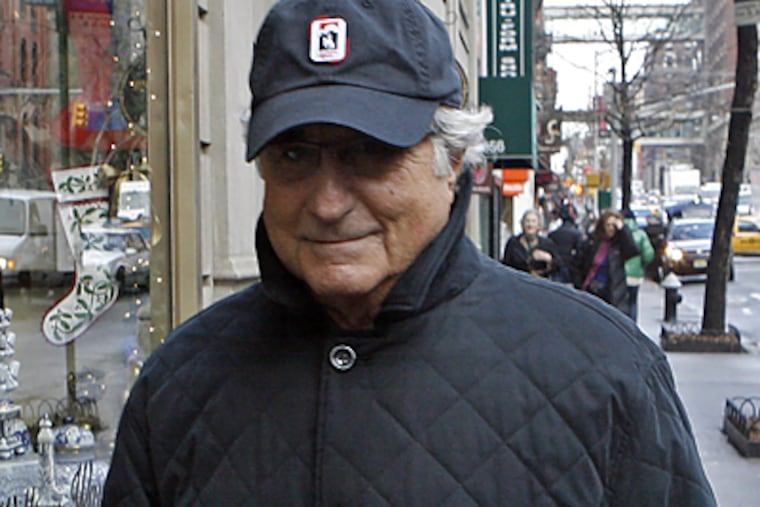What did Madoff do with all that money?
There's talk of business losses, his lavish lifestyle.

NEW YORK - It has become the biggest mystery to emerge from the $50 billion Bernard L. Madoff scandal: Where did all the money go?
Federal investigators are likely to take months trying to answer that question as they dig through the disgraced investor's records and attempt to unravel what may be the biggest financial fraud in history.
But several theories are being discussed among financial experts and at Wall Street watercoolers, Palm Beach country clubs and the offices of university accounting professors.
Among the theories: Madoff lost a bundle in bad investments; paid some of the money out to investors; stashed cash in foreign banks; and spent some on his lavish lifestyle.
There is also the possibility he inflated his claim of $50 billion in losses.
"He has plenty of houses and yachts, but not certainly enough to account for all this money," said Aswath Damodaran, a professor of finance at New York University. "It is tough to really lose 100 percent."
Madoff, 70, a former Nasdaq stock market chairman, has become one of the most vilified people in America since the announcement Dec. 11 that he had been charged by federal prosecutors with running a giant Ponzi scheme, paying returns to certain investors out of the principal received from others.
The scam included a global roster of investors, from retirees on Long Island to the International Olympic Committee, to charities worldwide. So far, investors have said that they have lost more than $30 billion, according to an Associated Press calculation.
Here are some possible scenarios about what hapopened to the money that was invested with Madoff.
Traded away. What is unclear at this point of the investigation is when the scheme began, but reports have indicated that it had been going on for decades. In the criminal complaint against Madoff, he told investigators that he "had personally traded and lost money for institutional clients, and that it was all his fault."
That suggests he may have blown investors' money through a failed trading strategy, and at some point felt compelled to cover up the mistakes.
Lost in this year's financial meltdown. Madoff's scheme was partly undone by this year's crisis in the stock and credit markets. The Dow had lost 36 percent through yesterday since the start of this year.
In the criminal complaint, Madoff was quoted as saying investors were seeking approximately $7 billion in redemptions. Madoff boasted of producing returns of about 10 percent for years, so individual investors who were getting battered in other parts of their portfolio might have taken some of those purported Madoff profits off the table.
At the same time, hedge funds were facing an unprecedented run on redemptions from their own investors. That meant the hedge funds may have had to quickly extract cash from their Madoff positions to pay their own investors back.
"People didn't stop believing in Madoff. They just needed the money, and that started this spiral," said Stephen Breitstone of the law firm Meltzer Lippe Goldstein & Breitstone, which is representing Madoff investors.
It is unclear how much of that $7 billion Madoff paid out to investors. But when things came crashing down, just $200 million to $300 million was left in the pot.
Went to Madoff personally. He could have spent some of the money on his lifestyle, which included multiple homes and yachts and memberships at some of the nation's most prestigious country clubs.
His three U.S. homes - a Manhattan penthouse, a beachfront mansion in the Hamptons on Long Island and a home in Palm Beach, Fla. - together have an estimated market value of more than $30 million, according to real estate experts.
The white-glove co-op in Manhattan where he lives requires residents to have at least $100 million in liquid assets so that they can cover any expenses even if their business goes bust or the market is hit with declines, said Faith Hope Consolo, chairwoman of the real estate firm Prudential Douglas Elliman's retail leasing sales division. The firm has leased retail space in that building, and she said it is "the epitome of luxury."
There also is speculation the money could show up in other spots - maybe in offshore bank accounts, in family members' names or elsewhere.
J. Boyd Page, a partner at the Atlanta law firm Page Perry who has represented clients in previous Ponzi scheme cases, noted that a good portion of Madoff's business was done internationally, and said some of the money could have been moved there.
"The auditors will have a field day with this, trying to trace the bank accounts," he said.
Went into investors' pockets. While many investors lost everything, some of them must have received payouts from Madoff over the years. Given that this was a Ponzi scheme, Madoff had to keep up his credibility by allowing people to tap their cash when they wanted.